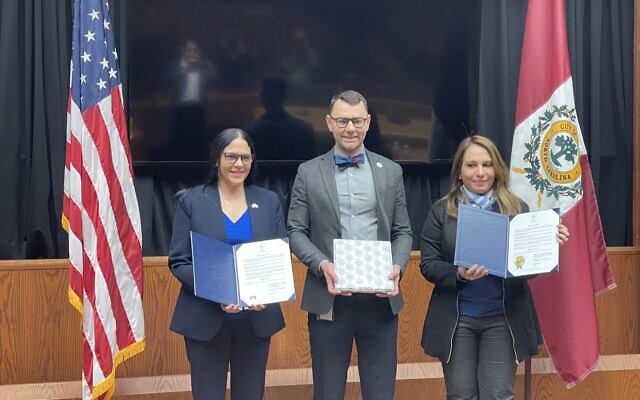Citizen Diplomacy: Necessary or Redundant?
Strengthening the bond between two countries now also depends on ordinary people, in what is known as citizen diplomacy.

Diplomacy has undergone several transformations in recent years and has evolved into something quite different from what it was. We are well and truly in an Information Age, which has radically changed several sectors, including media, education, politics and certainly diplomacy.
Traditional diplomacy of the past, which was confined to inter-governmental relationships, is no longer the only interface for diplomacy. Strengthening the bond between two countries now also depends on ordinary people, in what is known as citizen diplomacy.
Citizen diplomacy can be defined as an unofficial, informal interaction that aims to influence public opinion in order to assist leaders in resolving or managing conflict. It explores possible solutions out of the public eye and without formal negotiation. Citizen diplomats can be professors, researchers, students, businesspeople, athletes, artists, humanitarians, or tourists. In contrast, traditional diplomacy is defined as an attempt by an international envoy or practitioner to improve inter-governmental relations by communicating with another international envoy or practitioner.
The successful integration of traditional diplomacy and citizen diplomacy was embodied by the Consulate of Israel to the Southeastern United States and by the brilliant Anat Sultan-Dadon, the Consul General of Consulate, based in Atlanta.
I saw first-hand the dedicated work of the Consulate to integrate traditional and citizen diplomacy, utilizing the skills of Sharaka members [a grassroots organization based in Israel, the UAE, Bahrain and Morocco, and made up of social activists from Israel, the Arab Gulf States and others in the region who are dedicated to promoting warm ties and citizen diplomacy] in the delegation to North Carolina and Atlanta between Mar. 21 and Mar. 25.
What made the delegation successful is that the consulate, with the support of the consul general, realized the importance of citizen diplomacy in achieving its mission of promoting peace and demonstrating the positive impact of the Abraham Accords. The delegation’s schedule included meetings with members of Congress, the City Council of Raleigh, the Durham Mayor Pro Tempore, officials at the International Civil Rights Museum and faculty members and students from different universities.
Crucially, the delegation recognized that there is a sizeable number of people, especially in universities, that are against or skeptical of the Abraham Accords. This can partly be explained by high levels of antisemitism and of ill feeling towards members of Arab Gulf countries (mainly the UAE and Saudi Arabia) as well as a refusal to accept the Abraham Accords because they were brokered under the Trump administration.
Others cannot accept the Accords as “peace” treaties because Arab Gulf countries and Israel have never actually been at war with one another, and some argue that peace should first be established between the Israelis and the Palestinians.
In light of these reservations, it is clear that the challenges are substantial and undoubtedly relying on just traditional diplomacy will not produce a desirable outcome. Experts in diplomacy say that citizen diplomacy strengthens the role of non-state actors, especially in difficult interstate relations and helps resolve deep-rooted conflicts which political leaders alone cannot solve.
The Consul General, Anat Sultan-Dadon, is an enlightened woman who understands the challenges and recognizes the potential of citizen diplomacy. This was evident when she said, “Antisemitism is still here, racism is still here and that is why it’s important to work together. This delegation is about peace and learning from each other, so that we can reshape the Middle East. It is important that we bring all sides together because only through mutual understanding can we effect change.”
Citizen diplomacy’s distinguishing feature is informal people-to-people interactions, but this does not mean that they are exclusively unofficial. It complements, rather than replaces, state-centric institutional diplomacy, which will continue to be the dominant means by which foreign policy is enacted.
Some foreign policymakers have argued that the inclusion of non-state actors in public diplomacy can enhance a nation’s soft power. This brings to mind the words of Joseph Nye, who wrote that “soft power — getting others to want the outcomes that you want — co-opts people rather than coerces them.”
Therefore, in order for citizen diplomacy to be successful as an effective tool for conflict-resolution, it has to remain unofficial while also being government-directed. Diplomatic institutions have to take citizen diplomacy seriously and see it as a necessary rather than superfluous component of diplomatic efforts, because of its powers of persuasion.
The Consulate of Israel to the Southeastern United States is exemplary in its use of citizen diplomacy and it would be extremely wise for other diplomatic institutes of Arab Gulf countries to follow the same tack.
Dr. Najat Al-Saied is the media affairs and academic director of Sharaka and adjunct professor at AUE specializing in political media and communication. She can be reached at: najat@sharakango.com
- Dr. Najat Al Saied
- Opinion
- guest editorial
- citizen diplomacy
- Information Age
- international relations
- professors
- Researchers
- students
- businesspeople
- athletes
- artists
- humanitarians
- tourists
- Consulate of Israel to the Southeastern United States
- Anat Sultan-Dadon
- the Consul General of Consulate
- Israel
- the UAE
- Bahrain
- Morocco
- Congress
- the City Council of Raleigh
- the Durham Mayor Pro Tempore
- Abraham Accords
- Antisemitism
- Racism
- Joseph Nye
- Shakara



comments